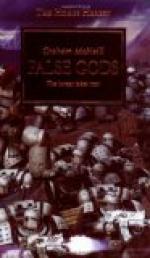[Illustration: “‘Aw, fergit it.’”]
This remark, duly reported to Madame Gianclis, had not put her in a humor to concede Madame Blavatsky’s soul, or any part of it, to Mrs. Athelstone. Promptly on hearing of her pretensions, so rumor had it, the Boston woman had announced the reincarnation of Theosophy’s high priestess in herself. And Boston believers were inclined to accept her view, as it was difficult for them to understand how any soul with liberty of action could deliberately choose a New York residence.
Now, all these things had filtered through to Naylor from those just without the temple gates, for whatever the quarrels of the two societies and their enemies, they tried to keep them to themselves. They had had experience with publicity and had found that ridicule goes hand in hand with it in this iconoclastic age. But out of these rumors, unconfirmed though they were, grew a vision in Naylor’s brain—a vision of a glorified spread in the Sunday Banner’s magazine section. Under a two-page “head,” builded cunningly of six sizes of type, he saw ravishingly beautiful pictures of Madame Gianclis and Mrs. Athelstone, and hovering between them the materialized, but homeless, soul of Madame Blavatsky, trying to make choice of an abiding-place, the whole enlivened and illuminated with much “snappy” reading matter.
Now, Simpkins was the man to make a managing editor’s dreams come true, so Naylor rubbed the lamp for him and told him what he craved. But the reporter’s success in life had been won by an ability to combine much extravagance of statement in the written with great conservatism in the spoken word. Early in his experience he had learned that Naylor’s optimism, though purely professional, entailed unpleasant consequences on the reporter who shared it and then betrayed some too generous trust; so he absolutely refused to admit that there was any basis for it now.
“You know she won’t talk to reporters,” he protested. “Those New York boys have joshed that whole bunch so they’re afraid to say their prayers out loud. Then she’s English and dead swell, and that combination’s hard to open, unless you have a number in the Four Hundred, and then it ain’t refined to try. I can make a pass at her, but it’ll be a frost for me.”
“Nonsense! You must make her talk, or manage to be around while some one else does,” Naylor answered, waving aside obstacles with the noble scorn of one whose business it is to set others to conquer them. “I want a good snappy interview, understand, and descriptions for some red-hot pictures, if you can’t get photos. I’m going to save the spread in the Sunday magazine for that story, and you don’t want to slip up on the Athelstone end of it. That hall is just what the story needs for a setting. Get in and size it up.”




